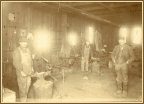Noble County - Richburg
The following information about Richburg, Oklahoma was reprinted from excerpts of "Richburg, A Short-lived Town in Auburn Township" in the History of Noble County Oklahoma Volume II, page 18 with the permission of the author, Marjorie Martin.*
In 1894, Ira Richardson, who lived eight miles east and two south of Perry (Auburn Township), made application to the United States Post Office department for a post office on his place. He wanted to name it Richardson. The department informed him that there was already a post office in Oklahoma named Richardson, but suggested that his post office be named Richburg. He accepted their suggestion. Because there were no rural mail routes, people called for their mail at General Delivery at the post office.
 Richburg was at the halfway point between Perry and Stillwater on a hack line. The hack made the twenty-five mile round trip between the two towns each day. It stopped at Richburg to pick up and leave mail, and also to change horses at the local livery stable. The hack was a three-seated wagon pulled by four horses. Passengers were welcomed. Later, Mr. Richardson left the area, and the post office was moved to Eli Brewer's house, which was across the road. His daughter, Bessie, operated the post office. In the Cherokee Strip run, Brewer had obtained his property by staking a claim at the Southwest Quarter of Section 30, Township 21 North, Range 2 East. Mr. Brewer was a blacksmith, at first setting up his shop in a tent. Later, he built a wooden structure for the shop and then added a livery stable.
Richburg was at the halfway point between Perry and Stillwater on a hack line. The hack made the twenty-five mile round trip between the two towns each day. It stopped at Richburg to pick up and leave mail, and also to change horses at the local livery stable. The hack was a three-seated wagon pulled by four horses. Passengers were welcomed. Later, Mr. Richardson left the area, and the post office was moved to Eli Brewer's house, which was across the road. His daughter, Bessie, operated the post office. In the Cherokee Strip run, Brewer had obtained his property by staking a claim at the Southwest Quarter of Section 30, Township 21 North, Range 2 East. Mr. Brewer was a blacksmith, at first setting up his shop in a tent. Later, he built a wooden structure for the shop and then added a livery stable.
About 1902, Dick Hansen moved a building in and set up a general merchandise and grocery store. His living quarters were in the back of the store. The main supplies stocked in a country store, at that time, were such necessities as flour, sugar, salt, lard, corn meal, coffee (in the whole bean), tobacco, and "coal oil" (kerosene) for the farmers' lamps. Money was scarce, and often times farm products were traded for items of equal value in the store.
The Brewers had built their house in 1894. It was a two room sod house. Each room measured 16 x 16 feet. This house served as their home and as a community gathering place. Among the activities were church song services and box and pie suppers. The money from these suppers was used to help build a school house named Oak Grove. This first school building was predominantly a log structure.
Some years later, the Richburg store was moved by Steve Diebold to his farm, which was one half mile east of the Brewer location on the opposite side of the road. Business at the general store was declining. The post office was discontinued in 1904, according to official records. It was no longer needed when Rural Free Delivery was started.
The site of the store and blacksmith shop on the northwest corner of Steve Diebold's property can still be identified. To get there, start at Grace Hill Cemetery and drive due east for eight miles. You will be at the corner of Harvest and County Road 190. Go one half mile further east, and the remains are on the south side of Harvest. The store was on the east; the blacksmith shop was on the west with a well in between. Currently, there is a depression and grove of trees where the store was, a hole where the well was, and the remains of a foundation where the blacksmith shop was. A new water meter is just north of the well-site.
* Resources for this story were obtained from articles written by Chester Speer (1910-1992) and Hedwig (Hattie) (Widiger) Shiever (1913-1997). Hattie had interviewed her parents, Julius and Emilie (Anklam) Widiger, and Effie (Brewer) Hirschman, daughter of Eli and Martha Brewer. Chester had interviewed John Diebold. Additional information was provided by Clyde Speer, Steve Bunch and the Cherokee Strip Museum of the Oklahoma Historical Society in Perry.
Click on the images for a larger view. NOTE: Close each pop-up window before opening another.
 Richburg Post office and General Store |
 Blacksmith Shop, 1900 |
 Interior of Richburg Blacksmith, 1900 |
